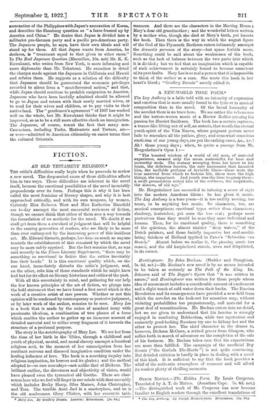A NEW-WORLD TONE POEM.*
The Lay Anthony is a fable told with an intensity of expression and emotion that is more usually found in the lyric or in musical
composition than in the noveL Of the broad humanity of
the novelist there is no trace here. We see rather the vehemence and the torture-woven music of a Hector Berlioz uttering his passion for Harriet Smithson. The book has a certain raptness, a trance-like lifting out of self, an ecstasia, that recalls the eternal youth-spirit of the Vita Nuova, whose poignant gesture never fails to reawaken all the pathos, glory, and somewhat conscious exoticism of our young days, ere yet the carking cares, &c., &c.!
Alt! those young days ; when, to quote a passage from Mr. Hergesheimer's Opus 1:— "The boasted wisdom of a world of old men, of material experience, seemed only the mean makeshifts for base and unworthy ends. The ecstasy sweeping from his heart to his brain, the delicious fancies, the rare harmonies that haunted him, the ineffable perfume of invisible lilacs—these were the true material from which to fashion life, these were the high things, the important. And youth was the time to grasp them : a swift premonition seized him of the coldness, the ineptitude, the disease, of old age."
Mr. Hergesheimer has succeeded in infusing a sense of style into the modern American idiom : he has given it music. The Lay Anthony is a tone poem—it is too swiftly moving, to tense, to be anything but music. Its characters, too, are
musical conceptions; emotional types rather than characters ; shadowy, featureless, yet none the less real ; perhaps more portentous than they would be were they more individual and human. Then, for its emotional quality, there is something of the quietism, the almost sinister " deep waters," of the Dutch painters, and those facially impassive but soul-annihi- lating thinkers of Holland typified in Pater's "Sebastian van Storck." Almost before we realize it, the piercing music has ceased, and the old harpischord stands, worn and dilapidated, in its corner.


































 Previous page
Previous page